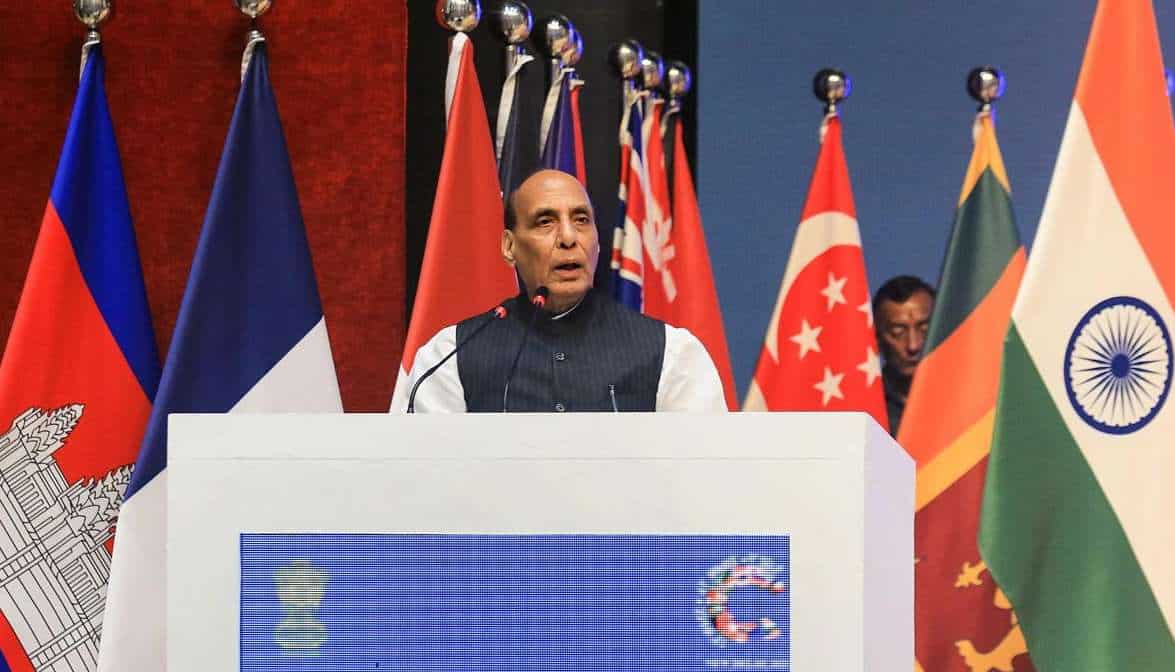Indo-Pacific Conference 2023
Experts said the war in Ukraine has provided China an opportunity to cater to the needs of countries that were earlier looking up to Russia. Case in point: China partnering with the Philippines for a payment system.

(left to right) Prof Flake, Ashok Malik, Sir Simon Gass, Vikrorija Starych-Samuoliene, Vikram Doraiswami speaking. (Photo by Danish Khan)
Over the last few years there has been plenty of action in the Indo-Pacific, largely due to the threat posed by China. The region has seen military exercises and other forms of engagement, particularly with the reinvigoration of Quad in 2017. On Thursday (November 30, 2023), London got a glimpse of the complex, multilateral strategy that has come to underpin the Indo-Pacific region. Three of the best known landmarks on Aldwych, in central London, the High Commissions of India and Australia, and King’s College, London played host to a day-long conference which saw eclectic discussions from diplomats, academics, and foreign policy experts including from Council on Geostrategy, a London-based independent think tank.
China and the Indo-Pacific
Not surprisingly, China figured prominently in the conference along with a range of issues. “It is good that the UK, France, Germany, Japan and others are there so that it becomes complicated. Complexity is what is needed there (Indo-Pacific) so that it is not just about US versus China,” said Prof. Gordon Flake, Chief Executive, Perth USAsia Centre, University of Western Australia.
In 2008, Australia had walked out of Quad when Kevin Rudd was the Prime Minister as it was concerned about its trading relationship with China. But much has changed since then, not only is Australia now a key member of Quad, but in 2021 Canberra joined London and Washington to form AUKUS, a trilateral security partnership for the Indo-Pacific.
“People in India follow the AUKUS debate,” said Ashok Malik, Partner, The Asia Group. Malik pointed out the dilemma that several smaller countries in the Indo-Pacific face. “They do not want to be seen openly supporting India, Australia or the UK. They want technology, health chains and other kinds of support.” China’s leap on the technology front and deep pockets has translated into increasing footprints in several parts of the world. This was alluded to by several speakers including Sir Simon Gass who was the adviser on intelligence to successive British Prime Ministers and has been the UK ambassador to Greece and Iran.
The war in Ukraine has provided China an opportunity to cater to the needs of countries who were earlier looking up to Russia. “Russia is engrossed in the Ukraine war and it is concerning that China is filling the security needs of smaller nations. Other countries need to do more,” said Malik. He cited the example of the Philippines which had been shopping for a partner for its payment system and for which China stepped up.
Vikram Doraiswami, the Indian High Commissioner to the UK, emphasised on the strengthening of partnerships that can make meaningful difference in the Indo-Pacific. “Maritime security is not just about naval power but also about non-traditional forms of security challenges. For example, illegal fishing is a huge issue for small countries which needs to be addressed.”
Technology sharing and cooperation
The UK’s bilateral relationship with Indo-Pacific countries like Japan and South Korea centres on technology. Technological cooperation provides an axis to counter China’s intemperate behaviour. At the AI summit in London, China took part in a top-level ministerial meeting, but did not feature in official handshakes and leader’s photographs. This was a calculated move by the UK to show indignation at China’s belligerence.
The Republic of Korea and the UK will co-host the next AI Safety Summit in 2024. The rapid use of technology and in particular the ascent of Artificial Intelligence has the potential to open new vistas for cooperation and alliance. “Very few liberal democracies will be able to work, negotiate with technology. So we need to help them,” said Sophia Gaston, a foreign policy expert and Academic Fellow at the European Policy Centre in Brussels.
The semiconductor industry is an archetype of transnational division of labour, pointed out Dr Reuben Abraham, CEO Artha Global. “East Asian economies are a major player in the supply chain. China has followed in the footsteps of Japan and Korea, but US companies still take half the profit generated from semiconductor.” The race for semiconductor will only intensify, but clearly there are plenty of opportunities for collaboration.
While Indian software giants have been leaving their mark worldwide, the rise of AI has plenty of risk factors for India too. “Much of the workforce in Indian software companies is at a basic level, and with improvement in AI, how many of those jobs will remain is a big question,” said Dr Reuben Abraham, CEO Artha Global. John Lee, Director, East West Futures voiced the concern that there is lack of skilled labour for semiconductor in India. Lee welcomed the recent India-EU deal on semiconductor which will identify areas for collaboration in R&D among several agreements.
India’s expansion of space technology and its Digital Public infrastructure offer good models for its allies. A crucial feature of India’s advancement has been the development of technologically agnostic platforms which has created a vibrant ecosystem. Abraham mentioned the success of UPI as an example and emphasised that both the UK and Australia can learn from the exciting developments in India’s digital revolution.
India-Australia relationship
Both the countries recognise that a fundamental challenge is how to build a new supply chain process away from China like Aatmanirbhar bharat. Over the last few years, Canberra and New Delhi, have been able to somewhat successfully negotiate the conundrum of continuing trade with China, but at the same time not shying away from registering their displeasure when required.
The warmth and confidence in relationship between both the countries was in ample display all through the successful co-hosting of the conference. Vikram Doraiswami’s eloquence was equally matched by sharp observations from Stephen Smith, Australia’s High Commissioner to the UK.
“Australia has long standing interest in a relationship with India, and it is now at the highest level,” said Smith. The signing of the FTA, participation in Malabar exercise, and recognition by both the countries that other small island nations need their own space points to a successful convergence of ideas. Geostrategic observers in Australia also draw comfort from the fact that over the last one decade India’s attitude towards maritime security has undergone a sea change. This is best exemplified by the increasing importance being given to the Indian Navy.
As far back as the 1940s, K.M. Pannikar, one of India’s foremost foreign policy strategists and diplomats, spoke about the need for India to focus on maritime security. Incidentally, Pannikar was also Independent India’s first ambassador to China and did much to spell out the early terms of engagement between Beijing and New Delhi. So there is a bit of irony that a key driver for Indian Navy’s modernisation has been India-China strategic rivalry.
Also at the conference was Jenny Bates, Director General, Indo-Pacific affairs, in the Foreign, Commonwealth and Development Office (FCDO) who said that UK’s focus in the Indo-Pacific is now an article of permanent policy and signifies patient, long-term diplomacy. The UK is committed to increasing the resilience of partners and has been working closely particularly with Singapore, Japan, India, and South Korea. Just a week ago, the South Korean President was on a State Visit to London and attended a banquet at Buckingham Palace, reflecting the UK’s increased interest in the region. Both the countries have launched negotiations on a modernised Free Trade Agreement (FTA) and Rishi Sunak’s office released a statement highlighting that they have “broad alignment” on the Middle East, Ukraine war, and China.











